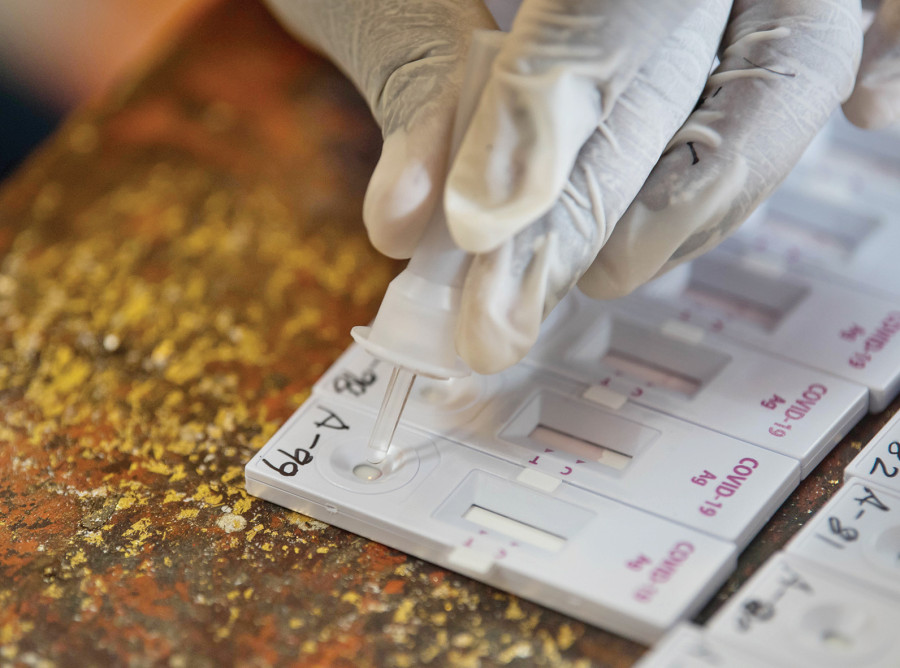Health
Public response to antigen testing poor in Kathmandu Metropolitan City
Fear of stigmatisation and lack of awareness blamed for poor public participation.
Anup Ojha
As part of the government’s plan to limit the Covid-19 spread through mass antigen testing across the country, Hiradevi Pokhrel, a member of the Kathmandu Metropolitan City’s Ward-32 asked ward officials to carry out the tests on all vegetable shop owners at Koteshwar. But as the officials visited the area early in the morning on May 28 and set up the testing camp, the vegetable vendors closed their shops and went home.
“None of them showed up for the test,” said Pokhrel. “Maybe because they fear testing positive as they will be out of business for several days in that case,” said Pokharel. The same thing happened when the officials visited Koteshwar again on Monday.
Her ward, which includes Koteshwar and Jadibuti areas, is one of the most Covid-19-affected places among the City’s 32 wards. Until Monday 483 antigen tests were carried out in the ward and 44 cases turned positive. Currently, the tests are being conducted at the ward offices.
In May last week, the City had announced plans to set up antigen testing camps in all 32 wards aiming to test 10,000 people per day and a total of 50,000 in five days. However, the mass testing campaign has received a poor response from the public allegedly due to fear and lack of awareness. The City had launched the campaign on May 28.
“We failed to garner public support for the campaign,” said Hari Kunwar, chief of the Public Health Division at the City. He blamed the ongoing prohibitory orders which are in place since April 29 for the poor public participation in the antigen testing campaign.
The City’s data show that it carried out a total of 6,450 antigen tests—3,460 on males and 2990 on females—in all its 32 wards by Monday. Among them 551 persons tested positive for Covid-19.
“The test is free and we had even organized an awareness campaign in the City, but people were still reluctant to get tested,” said Kunwar.
Among the 32 wards of the City, ward 19 saw the lowest number of people, just 24, turning up for the tests. Of the 24, six people tested positive.
Ward 19 Chairperson Sashilal Shrestha said they failed to convince people to opt for the tests. “I think people didn’t trust the antigen tests. On the other hand if polymerase chain reaction tests were free then many people would have come,” surmised Shrestha. His ward covers the western part of the Kathmandu Durbar Square including Maru Ganesh and Maruhiti areas.
Authorities estimate that 80 percent of the asymptomatic infected people, whose conditions are not severe, are not being tested and this is one reason for the coronavirus to have penetrated deep into society.
Nilkaji Shakya ward 25 chairperson shares the same problem as in ward 32.
“Mainly those who run vegetable shops in our area who come in contact with a huge number of people and those employed in the informal sector have not come for tests,” said Shakya. He blamed fear among the public of testing positive for their poor participation in the testing campaign. In his ward, 82 people have come for the test so far and seven were found infected with Covid-19.
Kathmandu district has been the epicenter of coronavirus infections during the ongoing second wave of the pandemic with the Kathmandu Metropolitan City reporting a total of 64,732 infections since last year. The active case count as of Monday stood at 7, 993 with 7,443 persons living in home isolation.
Chandra Mani Bhattrai, joint coordinator of the Covid-19 Support Centre of the Federation of Nepali Journalists blamed the city’s lack of mechanism to reach out to its residents for the poor response to the antigen testing campaign.
“The City attempted to impose the tests on the working class people. And the awareness campaign was limited to pasting notices and miking on the streets. They should have used social media, which is a more effective medium of communication,” said Bhattarai.
He also said many people still don’t trust antigen tests because they are not as accurate as the polymerase reaction tests. “Also after undergoing antigen testing, people are not provided a documented proof, which is necessary for taking up employment abroad,” said Bhattrai.
Dr Sher Bahadur Pun, chief of the Clinical Research Unit at Sukraraj Tropical and Infectious Disease Hospital said people didn't come for tests because of the City’s inability to make the public understand the importance of testing. “Another thing is that people feel nothing has happened to them until they become serious. Also, if they were certain about getting treatment easily at hospitals in the event of testing positive, they would have come for tests,” said Pun.
Pun advocates mass antigen testing saying it is the best way to know the nature and spread of the virus in communities. The City had announced plans to carry out antigen tests on symptomatic patients and also those who came in contact with them.
The city has been conducting the antigen tests with the kits provided by the government, which last month dispatched a total of 1.7 million kits to all the provinces. The test kits were received in donations from various countries with Switzerland alone providing 1.1 million.




 16.12°C Kathmandu
16.12°C Kathmandu.jpg)















